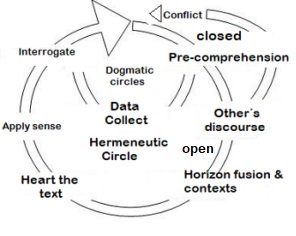
The fundamental question of the method
The historical question could not be missing, in fact before the book “The truth and method”, it was a lecture by Gadamer that started this work, called “The question of historical conscience”, the book was corrected and translated into English after publication of the masterpiece, and from this version came the Portuguese version.
and method”, it was a lecture by Gadamer that started this work, called “The question of historical conscience”, the book was corrected and translated into English after publication of the masterpiece, and from this version came the Portuguese version.
Thus the author states: “Because, only with the failure of the naive historicism of the historical century, it becomes evident that the opposition that exists between a-historical-dogmatic and historical, between tradition and historical science, between ancient and modern, is not absolute.” (GADAMER, 1997, p.22).
So it is in the face of this finitude of knowledge that one must depart: “The finitude of understanding itself is the way in which and where reality, resistance, the absurd, and the incomprehensible reaches validity. Anyone who takes this finitude seriously must also take the reality of history seriously” (Gadamer, 1997, p.24), and from there he resumes and reorganizes the hermeneutic circle.
Thus, what he calls effectual history starts from the understanding of “what makes the experience of you so decisive for all self-understanding” (idem), it will be from there that he will elaborate his philosophical hermeneutics, which seems paradoxical, he states: “precisely Heidegger’s critique to transcendental questioning and his thought of the “turn” (Kehre) serves as a basis for the development of the universal hermeneutic problem, which I undertake” (Gadamer, 1997, p.25), and thus for him “language does not arise in the consciousness of those who speaks” and has nothing to do with subjectivity, since the subject’s experience has nothing “mystical” or “mystifying”.
He clarifies that his methodology goes beyond a purely metaphysical view, and says about the method of idealism: “I think that Kant’s Critique of Pure Reason is binding, and that propositions that do nothing more than add, by thought, and dialectically, the infinite to the finite, the being in itself to what is humanly experienced, the eternal to the temporal, I consider them as mere extreme determinations, from which, by the strength of philosophy, no knowledge of our own will be able to develop. (GADAMER, 1997, p.26).
With regard to metaphysics, he clarifies that even the Hegelian tradition, which does not abandon the idea of infinity, has: “the tradition of metaphysics and especially its last great formulation, Hegel’s speculative dialectic, contains a constant proximity.” (idem).
And he resumes Heidegger’s question of the oblivion of being: “What does the end of metaphysics mean, as a science? What does it mean to finish in science? If science rises to total technocracy, and thereby covers the sky with the “night of the world” of the “oblivion of being”, the nihilism predicted by Nietzsche, then one can look behind the last glint of the sun that has set […]” (GADAMER, 1997, p.27).
The opening to the Other opens up a perspective of merging the horizons of the Being, which applies a new meaning to the text (or discourse) and allows one to question oneself about the truth and reach it, this is the hermeneutic circle.
Gadamer, H.G. (1997) Verdade e método. Transl. Flávio Paulo Meurer. Brazil: Petrópolis, RJ: ed. Vozes.









